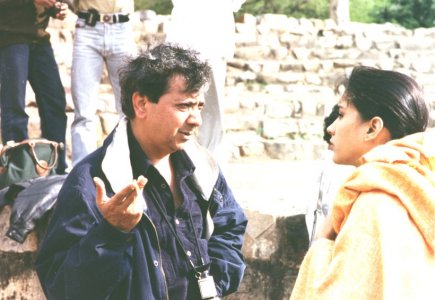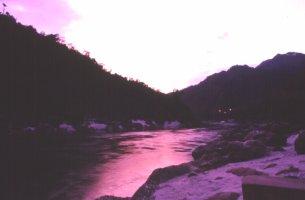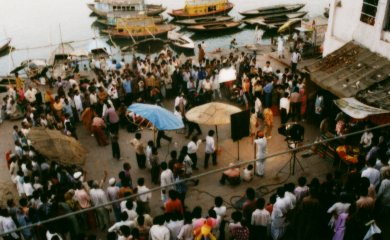

 Vijay Singh is an Indian film-maker, writer and screenplay writer based in Paris.
Vijay Singh is an Indian film-maker, writer and screenplay writer based in Paris.
After studying History at St. Stephen's College, Delhi and at the Centre for Historical Studies at the Jawaharlal Nehru University, New Delhi, he moved to the Ecole des Hautes Etudes en Sciences Sociales, Paris for his doctoral work.
While he was still a student in the early eighties, he started contributing articles to the French Press and has written extensively for Le Monde, Le Monde Diplomatique, Liberation, The Guardian, The Times of India and other newspapers.
He is the author of four books which have won wide critical acclaim: Jaya Ganga, In Search of the River Goddess, (Penguin, 1989. Rupa, 2005), La Nuit Poignardée (Flammarion, 1987), Whirpool of Shadows (Jonathan Cape, 1992. Rupa, 2005), The River Goddess (Gallimard Jeunesse 1993. Moonlight, 1994). His books have been translated into French and other European languages.
Many years after he wrote and directed the play Waiting for Beckett by Godot (1976), Vijay Singh made a short film, Shadi Lal, A Mystic Chef, for the French television (FR3), and Chami and Ana the Elephant (Man and Elephant, 1989), a 30' film, which has been shown on over 90 television channels worldwide.CLICK HERE FOR INFORMATION ON THE BOOK: Jaya Ganga, In Search of the River Goddess, (Penguin, 1989)
 2.
Why the Ganges?
2.
Why the Ganges?
Why
not! First all all, what you call the Ganges is for the Hindus a
beautiful celestial Goddess called Ganga. She took the form of a river
to protect humanity... I thought Ganga was an ideal thread for my story
- a great river, a great Goddess, a great woman, she is beautiful,
she's
charming, she's erotic, she's erratic, she is sense and non-sense, an
ideal companion for my big journey. Incidentally, the vedas and other
ancient scriptures were born on the banks of this very river. That's
where Hinduism first took form...
 3.
Wasn't it
difficult to shoot along 2500 kms of the Ganges?
3.
Wasn't it
difficult to shoot along 2500 kms of the Ganges? Vijay
Singh was a
novelist. He is now a filmmaker whose film "Jaya Ganga' has just been
nominated for the competition section of the Montreal World Film
Festival. LEELA JACINTO met the Paris-based director.
Vijay
Singh was a
novelist. He is now a filmmaker whose film "Jaya Ganga' has just been
nominated for the competition section of the Montreal World Film
Festival. LEELA JACINTO met the Paris-based director.
A young Indian writer chances upon a woman as enchanting and mysterious as the night as he meanders through a Parisian cemetery in the bewitching twilight hours. But she is no ordinary enigmatic woman, this. She is Jaya, as she calls herself, and she is Nadja. The Nadja who played muse to André Breton in 1920s, no less. Jaya is Nadja because of a ring a sadhu handed her on the banks of the holy Ganga. But then Jaya-Nadja disappears, leaving out hero to journey down the Ganga where he will encounter Zehra, and irresistible tawaif who not only resurrects the memory of Jaya, but will also lead him to exotic adventures and invariably, a search for his soul.
Out of such journeys, a thinking man's plot is born. So what if it's been a novel (Jaya Ganga, In Search of the River Goddess, Penguin, 1989) all along? So what if the author undertakes the adaptation and direction himself - a sort of artistic hara-kiri where you have no "insensitive director" to rave and rant about?
But then Vijay Singh is a brave man. An Indian writer living in Paris (sounds familiar?) who dares to bare his literary soul to something as flip as a camera. And right now, Singh has a lot to rant about.
Like the traffic. He's 35 minutes late for his appointment, he's perspiring, he's crashing through the five-star lobby with a bright young things in tow, and he's very, very sorry to keep you waiting, he sputters, as he vigorously shakes your hand. "These distributors," he grimaces, crinkly elfin-face contorting with distaste.
Produced by Silhouette Films and co-produced by NFDC, Sodaperaga Productions (France) and Kismet Talkies (USA), this 84' Hindustani/French film with English subtitles is finally ready for release, but just when it will reach Indian shores, Singh is not revealing.
For the rest, he's quite happy to disclose all. "This is Smriti Mishra," he beams, papa-proud. He proceeds to tell you about the fine performance he has managed to extract from a rank beginner. "I was searching all over for my Zehra - London, Calcutta, Paris, Madras... I was looking at a host of actresses - Kitu Gidwani, Juhi Chawla, Madhuri Dixit," the names come hard and fast, "but my biggest problem was their commercial stardom. I had auditioned Smriti, but she hadn't done too well then. But I guess she really wanted the role because one day she approached me and informed me with a childlike confidence "Mein aapko itna hi keh sakti hoon - if you give me love, I can go far." And, I thought, my God, this girl is so honest. Now, after working with her, I can honestly say none of the others could have matched her."
Nobody can match Singh for sheer enthusiasm. An alumnus of St Stephen's College and JNU, Delhi, he moved to Ecole des Hautes Etudes en Sciences Sociales, Paris, for his doctoral work which he dropped as his feature writing career (Le Monde, Le Monde Dimplomatique, Libération, Guardian and others) blossomed. His literary career which spans Jaya Ganga, Whirlpool of Shadows, La Nuit Poignardée, and The River Goddess, has secured considerable international press - largely laudatory.
So why a film? "You see, when Costa Gavras saw Man and Elephant, he really liked it. I don't know why - I don't think it's a great film. So when Jeanne Moreau insisted that Jaya Ganga has visual potential, I showed it to Costa hoping he would direct the film. He read it and his verdict was: "Seducing. But not seducing enough." So I decided to direct it myself.
After three books and a festival-hopping film on it, the river still haunts Vijay Singh. Ratnottama Sengupta met the director of Jaya Ganga which will be released this month.
Rating ****
At the moment, Vijay Singh is a bit tired. Of festivals? "Of films," he says. To your surprise. For, how many producer-directors have the fortune to see their debut film enter the competition at Montreal; travel to festivals in Quebec, Belgium, Vancouver, Argentina, Stockholm, San Francisco, Germany, Africa - and also secure a commercial release back home in India?
And yet the man behind the victorious Jaya Ganga sounds - and feels - exhausted. "Direction was game," says Vijay Singh. "But production work was horrible." More so, since there were three angles to this Indo-Franco-American coproduction. But it is marketing that has taken the go out of the Paris-based writer-filmmaker...
Jaya Ganga sailed out on its cinematic journey from the shores of literary acclaim. The book described as "a novel, an autobiographical travelogue, a reportage, a travel diary..." had been surprisingly well-received both in France and India. And the film has consolidated the rewards of that journey which started with a married woman who was visiting Vijay Singh in Paris, leaving a good-bye note to say: "My karma would be fulfilled if I could spend three days on the Ganga with you..."
The "three days" grew on Vijay Singh who had never lived by the Ganga, yet cherished the childhood memory of watching the river at Rishikesh. That's where Nishant, the Paris-based hero of Jaya Ganga, starts his journey. Soon after, he meets Zehra, the tawaif (the courtesan), he is willing to spend liberally on. Zehra is equally happy to elope with him - until, at the end of the dream journey, she realises Nishant is fascinated, if not in love with, Jaya/Nadja - the woman who is French but may have been Indian; one who seems to exist but could well be mere illusion.
Esoteric? No. Erotic? Yes. Mystical? Perhaps. Romantic? Certainly. A near perfect cast, a dream come true location, and languorous camera, a grip over the medium that's remarkable in a directorial debut. Above all, a sincerity that comes through every frame of the film which is no doubt made for the west but by one whose years abroad have not made him forget what Ganga is to the fabric of Indian life.
Vijay Singh has an explanation for this "When you live abroad, you live in semiotic memory." But when you know Singh a little better, you wonder if the collective unconscious can adequately explain the abiding presence the river is in his life. When the book came out in 1989, the writer was hailed as "less cerebral than Rushdie, less formal than Anita Desai, less clever than Vikram Seth, but more wholesome and fulfilling for the Indian soul." After such effusive praise, few would have touched Ganga again. But for Vijay Singh, it only reinforced his obsession with the river. Thus came the English version of the novel in French; an autobiography of Ganga for the Pen International Symposium in Venice; a children's book on the river; and then the film... "It's as if the river-woman has continued to haunt me - seducing, tempting, wafting..." says Singh.
Now, with
the a lot of sweat and toil behind him - and Rs 3.70 crore spooled in
the cans - Ganga still lingers on Vijay Singh's consciousness...
"If I still enjoy the favour of life," it will be Ganga again, and
again, completing a trilogy..."
Now, what
can one say to that? Jai Ganga (Long Live the Ganges!)